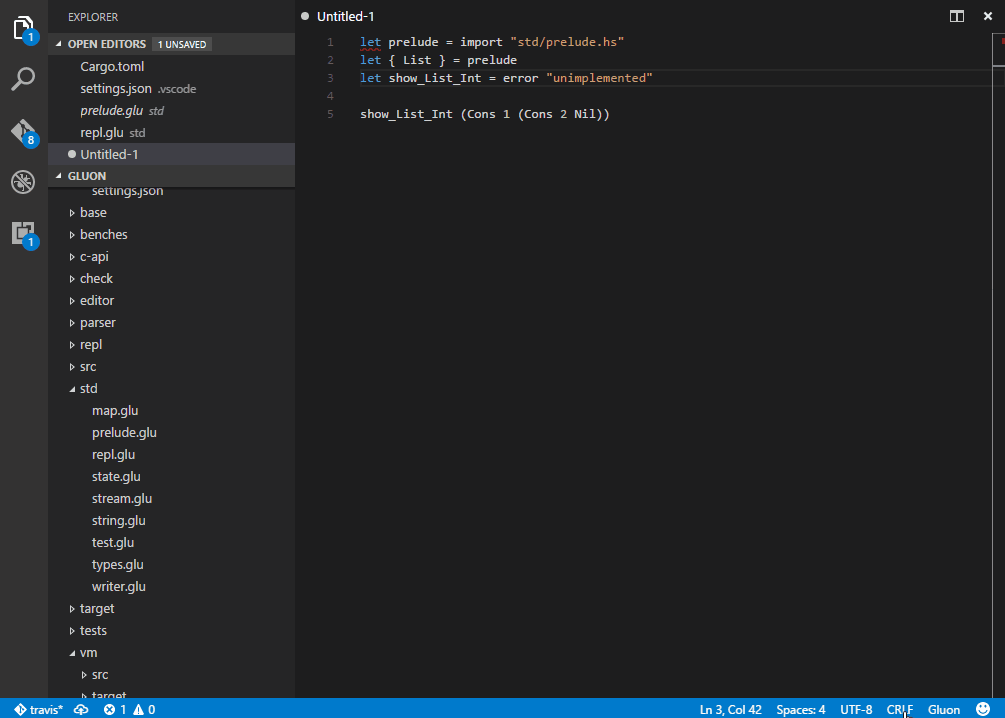(Previously called embed_lang)
Gluon is a small, statically-typed, functional programming language designed for application embedding.
-
Statically typed - Static typing makes it easier to write safe and efficient interfaces between gluon and the host application.
-
Type inference - Type inference ensures that types rarely have to be written explicitly giving the all the benefits of static types with none of the typing.
-
Simple embedding - Marshalling values to and from gluon requires next to no boiler plate allowing functions defined in Rust to be directly passed to gluon.
-
UTF-8 by default - Gluon supports unicode out of the box with utf-8 encoded strings and unicode codepoints as characters.
-
Separate heaps - Gluon is a garbage collected language but uses a separate heap for each executing gluon thread. This keeps each heap small, reducing the overhead of the garbage collector.
-
Thread safe - Gluon is written in Rust which guarantees thread safety and gluon keeps the same guarantees allowing multiple gluon programs to run in parallel (example)*
* Parallel execution of gluon programs is a recent addition and may still have issues such as deadlocks.
Gluon requires a recent Rust compiler to build (1.9.0 or later) and is available at crates.io and can easily be included in a Cargo project by adding the lines below.
[dependencies]
gluon = "0.1.0"Currently the easiest way to interact with the gluon virtual machine is through Rust but a rudimentary C api exists which will be extended in the future to bring it closer to the Rust api.
The gluon extension for Visual Studio Code provides syntax highlighting and completion. To install it, search for gluon among the extensions.
Gluon has a small executable which can be used to run gluon programs directly or to run a small REPL. The REPL can be started by passing the -i flag to the built repl executable which can be run through cargo run -- -i).
REPL features:
-
Evaluating expressions (expressions of type IO will be evaluated in the IO context).
-
Printing help about available commands with
:h -
Loading files with
:l path_to_filethe result of evaluating the expression in the loaded file is stored in a variable named after the filename without an extension. -
Checking the types of expressions with
:t expression -
Printing information about a name with
:i name.
Example::i std.prelude.List type std.prelude.List a = | Nil | Cons a (std.prelude.List a) /// A linked list type -
Exit the REPL by writing
:q
io.print "Hello world!"let factorial n : Int -> Int =
if n < 2
then 1
else n * factorial (n - 1)
factorial 10Larger example which display most if not all of the syntactical elements in the language.
// `let` declares new variables.
let id x = x
let factorial n =
if n < 2
then 1
else n * factorial (n - 1)
// `type` is used to declare a new type.
// In this case we declare `Countable` to be a record with a single field (count) which is a function
// taking a single argument and returning an integer
type Countable a = { count : a -> Int }
// "Counting" an integer just means returning the integer itself
let countable_Int : Countable Int = { count = \x -> x }
let list_module =
// Declare a new type which only exists in the current scope
type List a = | Cons a (List a) | Nil
let map f xs =
match xs with
| Cons y ys -> Cons (f y) (map f ys)
| Nil -> Nil
// Define a count instance over lists which counts each of the elements and sums
// the results
let countable_List c : Countable a -> Countable (List a) =
let count xs =
match xs with
| Cons y ys -> c.count y + count ys
| Nil -> 0
{ count }
{
// Since `List` is local we export it so its constructors can be used
// outside the current scope
List,
countable_List,
map
}
// Bring the `List` type and its constructors into scope
let { List, countable_List } = list_module
// Create a `Countable` record for `List Int`
let { count } : Countable (List Int) = countable_List countable_Int
if count (Cons 20 (Cons 22 Nil)) == 41 then
error "This branch is not executed"
else
io.print "Hello world!"If you are interested in contributing to this project there are a few issues open marked as beginner which should be possible to handle for someone unfamiliar with the code. If you find something that looks interesting leave a comment on the issue so I know about it and can give some assistance if needed.
These goals may change or be refined over time as I experiment with what is possible to with the language.
-
Embeddable - Similiar to Lua it is meant to be able to be included in another program which can use the virtual machine to extend its own functionality.
-
Statically typed - The language uses a Hindley-Milner based type system with some extensions which allows for simple and general type inference.
-
Tiny - By being tiny the langauge is easy to learn and makes the implementation small.
-
Strict - Strict languages are usually easier to reason about, especially considering that is what most people are accustomed with. For cases where lazines is desired an explict type is provided.
-
Modular - The library is split into parser, typechecker and virtual machine + compiler. Each of these components can be use independently of each other allowing applications to pick and choose exactly what they need.
This language takes its primary inspiration from Lua, Haskell and OCaml.
